
(Download a higher
resolution picture by clicking on any picture below.) 
 Howard Hughes' giant
Flying Boat is now on display at the Evergreen Aviation
Museum.
Howard Hughes' giant
Flying Boat is now on display at the Evergreen Aviation
Museum.During world War 2, a consortium was formed by Howard Hughes and Henry Kaiser to create a giant, wooden, flying boat transport. The airplane was designated HK-1 for the Hughes-Kaiser consortium. After Henry Kaiser left the project the designation of the wooden aircraft was changed to H-4. Later, a contest held among Hughes Aircraft employees produced the name Hercules. Hughes did not like the name Hercules, nor did he appreciate the phrase Spruce Goose. He always referred to the airplane as the Flying Boat.
The wooden buildings in which its components were constructed were the largest in the world at the time. They still stand at the old Hughes Airport property.
Most of the wood used in the construction of the Flying Boat was Birch. The nails used to hold its wooden components in place were removed once the glue set.
Considerable controversy surrounded its funding. The government funded the original project, which called for one prototype Flying Boat and the production of two additional aircraft. The original government contract budgeted $18 million for three aircraft; however Hughes infused $7 million of his own capital into the project. Only one flying boat was completed. It was flown once in 1947, then it was returned to its hangar, where it remained for thirty-three years. It was carefully stored, maintained almost as an active aircraft until 1980. Each month its engines were run up. An extensive air conditioning system maintained a carefully controlled environment for the wooden behemoth.
The Flying Boat was removed from its hangar on October 29, 1980. For two days it floated in Los Angeles Harbor before it was lifted onto a temporary storage area on shore. On February 10, 1982 it was lifted from its storage location onto a barge. The next morning it was floated across the harbor to a giant geodesic dome to be displayed by the Wrather Corporation.
Wingspan: 320 feetLength: 219 feetWing Area: 11,430 square feetMaximum Take-off Weight: 400,000 poundsMaximum Cargo Payload: 130,000 poundsPowerplant: 8x 3,000 hp Pratt & Whitney R4360-4, 28 cylinder radials |
The hangar housing Howard Hughes' giant Flying Boat still stood in July 1980. The airplane had narrowly escaped being distributed to nine air museums when Wrather Corporation purchased it with the intent of creating a tourist attraction adjacent to the Queen Mary in Long Beach Harbor.
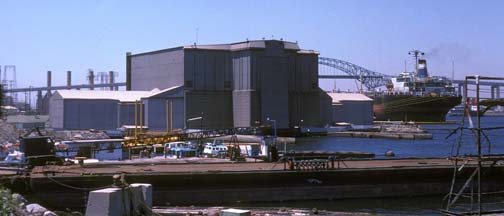 The Hughes
Flying Boat suffered damage when the original hangar flooded in
September 1953. This larger hangar was constructed around the
Flying Boat.
The Hughes
Flying Boat suffered damage when the original hangar flooded in
September 1953. This larger hangar was constructed around the
Flying Boat.
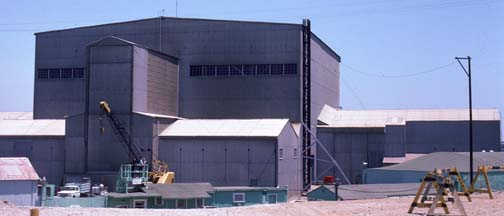 Watch for this picture to appear in the History Channel production Man, Moment, Machine.
Watch for this picture to appear in the History Channel production Man, Moment, Machine.
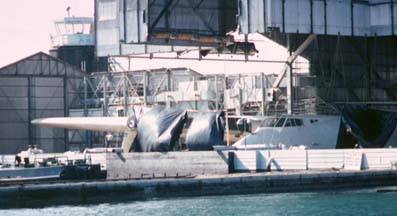 Much of the hangar of the Hughes Flying Boat was removed by
October 26, 1980 in preparation for floating the airplane out of
the building. Wrather corporation had ordered that large plastic
tarps be hung in front of the Flying Boat to obstruct the view of
bay tour boats. Ducting can be seen for the air conditioning
system that kept the environment of the Flying Boat within a
narrow temperature range.
Much of the hangar of the Hughes Flying Boat was removed by
October 26, 1980 in preparation for floating the airplane out of
the building. Wrather corporation had ordered that large plastic
tarps be hung in front of the Flying Boat to obstruct the view of
bay tour boats. Ducting can be seen for the air conditioning
system that kept the environment of the Flying Boat within a
narrow temperature range.
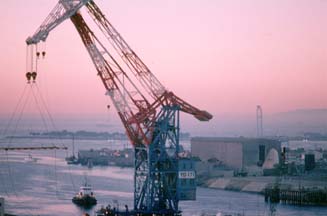 The vertical stabilizer of the
Hughes Flying Boat can be seen protruding from the partially
disassembled hangar on the morning of October 29, 1980.
The vertical stabilizer of the
Hughes Flying Boat can be seen protruding from the partially
disassembled hangar on the morning of October 29, 1980.
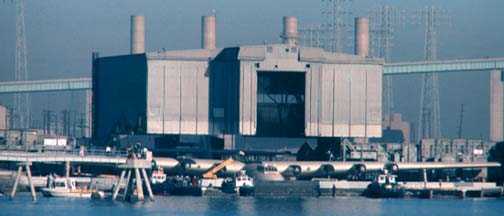 Subsidence resulting from the extraction of petroleum from the
area had lowered the hangar to the point that the floating of the
Flying Boat had to be timed to coincide with low tide to allow
the tail to clear the hangar roof.
Subsidence resulting from the extraction of petroleum from the
area had lowered the hangar to the point that the floating of the
Flying Boat had to be timed to coincide with low tide to allow
the tail to clear the hangar roof.
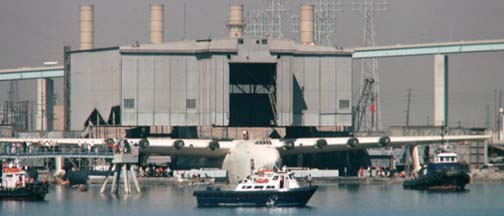 October 29, 1980, the Hughes Flying
Boat floats out of its hangar for the first time since 1947.
October 29, 1980, the Hughes Flying
Boat floats out of its hangar for the first time since 1947.
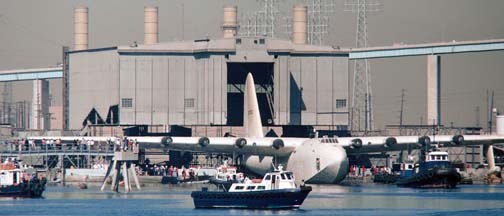 Howard Hughes' Flying Boat emerges
from its hangar after thirty-three years. This picture will also appear in the History Channel production Man, Moment, Machine.
Howard Hughes' Flying Boat emerges
from its hangar after thirty-three years. This picture will also appear in the History Channel production Man, Moment, Machine.
You can buy prints up to 11" by 16" or 5" x 7" greeting cards of this photograph.
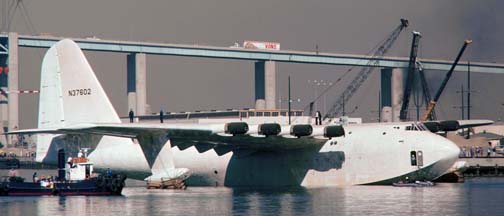 Since its only flight, the Hughes
Flying Boat has had R-4360-TSB-3G engines of increased horespower
installed, been painted white, and its registration has been
changed from NX37602 to N37602.
Since its only flight, the Hughes
Flying Boat has had R-4360-TSB-3G engines of increased horespower
installed, been painted white, and its registration has been
changed from NX37602 to N37602.
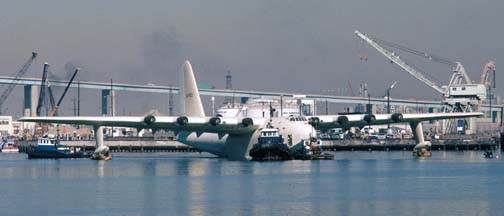 Howard Hughes' Flying Boat floating
in Los Angeles Harbor.
Howard Hughes' Flying Boat floating
in Los Angeles Harbor.
You can buy prints up to 11" by 16" or 5" x 7" greeting cards of this photograph.
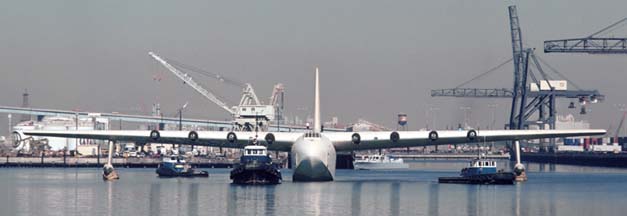 The HK-1 Hercules waits while cranes
are moved into place to pick up its cradle from the now flooded
hangar.
The HK-1 Hercules waits while cranes
are moved into place to pick up its cradle from the now flooded
hangar.
You can buy prints up to 11" by 16" or 5" x 7" greeting cards of this photograph.
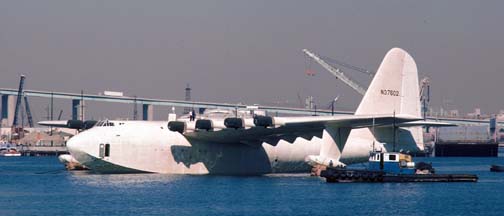 The Flying Boat continues to wait
as one of the cranes breaks through the hangar floor and sinks
into the saturated ground underneath.
The Flying Boat continues to wait
as one of the cranes breaks through the hangar floor and sinks
into the saturated ground underneath.
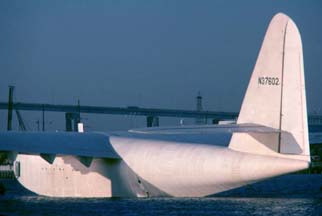 This view of the Hughes Flying Boat
shows how aerodynamically clean the design of its fuselage was.
This view of the Hughes Flying Boat
shows how aerodynamically clean the design of its fuselage was.
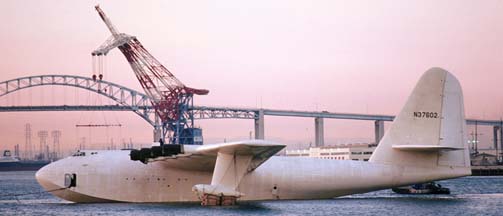 Herman the German, a four hundred
ton capacity crane seized from Germany at the end of World War 2,
is on hand to lift the Hughes Flying Boat out of the water and
set her onshore to be stored for the next year.
Herman the German, a four hundred
ton capacity crane seized from Germany at the end of World War 2,
is on hand to lift the Hughes Flying Boat out of the water and
set her onshore to be stored for the next year.
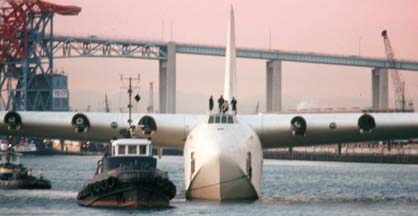 A nervous group confers on the wing
of the Hughes Flying Boat at sunset. The plan had not included
leaving the wooden hull in the water overnight.
A nervous group confers on the wing
of the Hughes Flying Boat at sunset. The plan had not included
leaving the wooden hull in the water overnight.
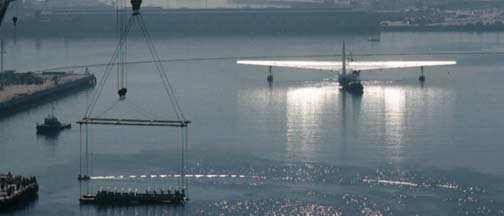 Sunlight glints from the wings of
the Hughes Flying Boat on the morning of October 30, 1980. The
flying boat's cradle has been recovered and is suspended from
Herman the German.
Sunlight glints from the wings of
the Hughes Flying Boat on the morning of October 30, 1980. The
flying boat's cradle has been recovered and is suspended from
Herman the German.
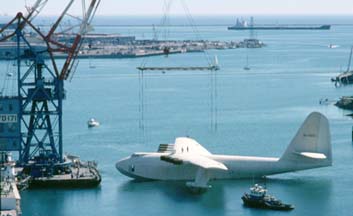 The cradle of the Hughes Flying
Boat has been set on the floor of the harbor. The Flying Boat has
been floated into place.
The cradle of the Hughes Flying
Boat has been set on the floor of the harbor. The Flying Boat has
been floated into place.
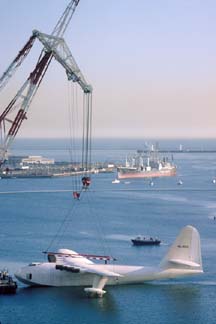 Later in the afternoon, as scuba
divers are attaching the cradle to the cables of the crane, a
Lykes Lines cargo ship enters the harbor beyond the Hughes Flying
Boat.
Later in the afternoon, as scuba
divers are attaching the cradle to the cables of the crane, a
Lykes Lines cargo ship enters the harbor beyond the Hughes Flying
Boat.
You can buy prints up to 11" by 16" or 5" x 7" greeting cards of this photograph.
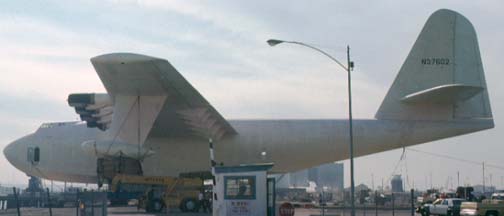 Herman the German lifted the Hughes
Flying Boat onshore during the night. It is seen here sitting on
its cradle on the morning of October 31, 1980. A protective cover
was placed over it, and it waited something over a year for its
new display location on Pier J to be prepared.
Herman the German lifted the Hughes
Flying Boat onshore during the night. It is seen here sitting on
its cradle on the morning of October 31, 1980. A protective cover
was placed over it, and it waited something over a year for its
new display location on Pier J to be prepared.
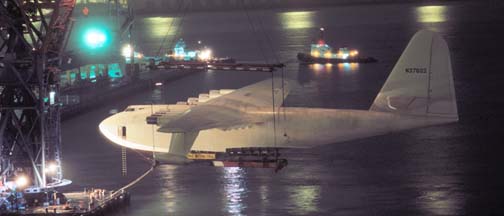 Go to Page 2 of Flying Boat pictures for the history of
the Flying Boat from 1982 onward.
Go to Page 2 of Flying Boat pictures for the history of
the Flying Boat from 1982 onward.
Giant Flying Boats |
||||||
| First Flight | Wing Span | Length | Wing Area | Gross Weight | Engines | |
| Saunders Roe Princess | 1952 |
219ft,06in |
148ft,00in |
5,250 |
330,000 |
10 x 3,500 hp Proteus |
| Hughes Flying Boat | 1947 |
320ft,00in |
218ft,06in |
11,430 |
300,000 |
8 x 3,500hp R4360 |
| Blohm und Voss BV-238 | 1945 |
197ft,05in |
142ft,8in |
3,930 |
176,400 |
6 x BMW 801 |
| Martin JRM Mars | 1942 |
200ft,00in |
117ft,00in |
3,683 |
144,000 |
4 x 2,000 hp R3350 |
| Blohm und Voss BV-222 | 1940 |
150ft,11in |
120ft |
2,744 |
108,000 |
6 x 1,000 hp BMW-Bramo Fafnir 323R |
| Martin PBM Mariner | 1939 |
118ft,00in |
79ft,00in |
1,408 |
41,000 |
2 x 1,700 hp R2800 |
| Boeing 314 | 1938 |
152ft,00in |
106ft,00in |
2,607 |
82,000 |
4 x 1,200 hp R2600 |
| Convair PB2Y Coronado | 1937 |
115ft,00in |
79ft,00in |
1,780 |
63,000 |
4 x 1,000 hp R1830 |
You can buy a 2020 calendar featuring my photographs of Howard Hughes' giant Flying Boat, popularly called the Spruce Goose.
Howard Hughes' giant Flying Boat, the Spruce Goose, floated out of the hangar it resided inside for thirty-three years into Los Angeles Harbor on October 29, 1980. It took two days to pick it up with Herman the German and place it on land for temporary storage. On February 10, 1982, it was lifted onto a barge for transportation to the geodesic dome where it was displayed to the public for eleven years.
 Put a copy of the Spruce Goose 2020 calendar in your Lulu.com shopping cart for $14.95.
Put a copy of the Spruce Goose 2020 calendar in your Lulu.com shopping cart for $14.95.
 Book about
Howard Hughes giant flying boat available from
Book about
Howard Hughes giant flying boat available from 
 Howard Hughes And His Flying Boat by Charles
Barton
Howard Hughes And His Flying Boat by Charles
Barton
 Find all about the
Howard Hughes giant flying boat
at Wikiverse.org.
Find all about the
Howard Hughes giant flying boat
at Wikiverse.org.
Link to a page describing the Evergreen Aviation Museum which is restoring the Hughes Flying Boat for display in McMinnville, Oregon.
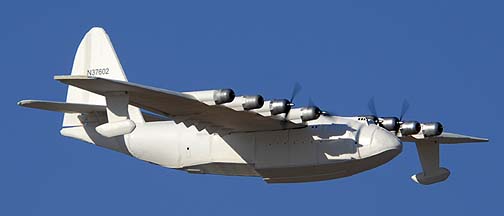 Barrett Hochaus built a radio-controlled model of Howard Hughes giant Flying Boat, popularly known as the Spruce Goose, with a wing span of nearly ten feet. It is powered by four electric motors. Despite its large size, it wieghs less than seven pounds. It made its maiden flight at the Gilbert Rodeo Grounds on Saturday, January 22, 2011.
Barrett Hochaus built a radio-controlled model of Howard Hughes giant Flying Boat, popularly known as the Spruce Goose, with a wing span of nearly ten feet. It is powered by four electric motors. Despite its large size, it wieghs less than seven pounds. It made its maiden flight at the Gilbert Rodeo Grounds on Saturday, January 22, 2011.
Send a message to Brian.